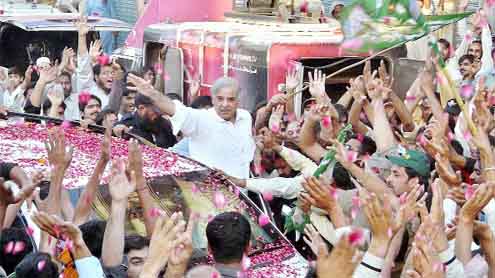 Prime Minister Yousaf Raza Gilani addressed the nation on Sunday at a time when tensions between the executive and the judiciary were at an all-time high. The Supreme Court (SC) had taken a tough stance against the executive after some television channels aired the news about the reversal of the executive order regarding the judges’ reinstatement. Despite the fact that the prime minister denied these rumours, the apex court still believed that something was brewing in the corridors of power and sought for a written assurance from the government in this regard. It seems that Prime Minister Gilani then thought it best to put the rumours to rest once and for all by addressing the nation. He made a strong point about the stature of the office of the prime minister and rightfully said, “When the prime minister says something, whether it is verbally or in writing, it ought to be respected by everyone.”
Prime Minister Yousaf Raza Gilani addressed the nation on Sunday at a time when tensions between the executive and the judiciary were at an all-time high. The Supreme Court (SC) had taken a tough stance against the executive after some television channels aired the news about the reversal of the executive order regarding the judges’ reinstatement. Despite the fact that the prime minister denied these rumours, the apex court still believed that something was brewing in the corridors of power and sought for a written assurance from the government in this regard. It seems that Prime Minister Gilani then thought it best to put the rumours to rest once and for all by addressing the nation. He made a strong point about the stature of the office of the prime minister and rightfully said, “When the prime minister says something, whether it is verbally or in writing, it ought to be respected by everyone.”
The leader of the House is the highest office in a democratic parliamentary dispensation. Thus, it was amazing to see that in a democratic country where parliament is supreme, the prime minister had to hit this point home. During his speech, Mr Gilani was flanked by the chief ministers of Khyber Pakhtunkhwa, Balochistan and Gilgit-Baltistan, senior ministers from Sindh and Punjab, and the prime minister of Azad Kashmir. This can be deemed as a ‘show of strength’. It is indeed unfortunate that the dignity and respect of the premier’s office was put in the dock by the superior judiciary based on mere rumours in the media. There is no doubt that a free, independent and strong judiciary is an integral part of a strong democratic system but there are certain lines that must not be crossed by any state institution. Mr Gilani’s measured message hit the nail on the head. Mutual respect is the need of the hour. He also extended an olive branch to the judiciary by asking them to work together with the government to “administer justice to the poor people of the country”. This is indeed a good proposition and is exactly what the masses need right now. A clash of institutions would not be in anyone’s interest in these trying times. The people are looking for redress and not any action that could further compound their problems. Meanwhile, federal Law Minister Babar Awan cautioned that no state institution “could indulge in politics as the constitution has already determined their and civil servants’ role”. Monday’s proceedings in the apex court were without incident and gave the impression that the prime minister’s message has been heard.
While the government is busy trying to settle the executive-judiciary tussle, the PML-N chief, Nawaz Sharif, laid the blame for the country’s woes at President Zardari’s doorstep. He accused the president of misusing democracy for his personal gains and demanded that Mr Zardari “bring back home the plundered national wealth and apologise for his misdeeds”. Mr Sharif’s accusations are not just absurd but exaggerated too. While Mr Zardari may have his contributions to our share of problems, he cannot be accused for all the mess we are in. As for bringing back the wealth, in a country like ours corruption is the basic principle of the whole political class. This is not to say that corruption is justified, but if Mr Zardari were to bring back the ‘looted’ wealth, so should Mr Sharif and his ilk. Instead of agitating and playing politics, Mr Sharif should act rationally because the need for democracy cannot be overstated – Dailytimes











